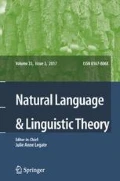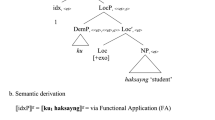An analysis of null object constructions in colloquial Brazilian Portuguese is brought to bear on the theory of empty categories. Focusing on their properties in adjunct clauses, it is argued that at least some null objects must be analyzed as pro's, even though they are not morphologically identified. An empty topic variable approach (Huang, 1984) is argued to be empirically inadequate and to have no explanatory advantage over an analysis on which all null objects are pro's, in spite of the fact that there exist gaps in the distribution of null objects that appear to support the empty topic hypothesis. Brazilian Portuguese is shown to be a language that requires subject pro to be identified. It is suggested that object pro must also be identified and that the notion of what counts as identification must be broad enough to include the possibility of intrinsic specification of features. In the absence of identifying features on its govverning head, pro is predictably third person.
Similar content being viewed by others
References
Aki, Takamichi: 1987, ‘On the Distribution and Interpretation of Null Operators’, Descriptive and Applied Linguistics 20, 1–12.
Authier, J.-Marc P.: 1988, ‘Null Object Construction in Kinande’, NLLT 6, 19–37.
Baltin, Mark: 1978, ‘Toward a Theory of Movement Rules’, unpublished Ph.D. dissertation, MIT.
Brody, Michael: 1984, ‘On Contextual Definitions and the Role of Chains’, Linguistic Inquiry 15, 355–326.
Campos, Héctor: 1986a, ‘Indefinite Object Drop’, Linguistic Inquiry 17, 354–359.
Campos, Héctor: 1986b, ‘Complementos directos indefinidos en romance’, Revista de Linguística Teórica y Aplicada 24, 81–90.
Chomsky, Noam: 1977, ‘On Wh-Movement’, in Peter Culicover, Adrian Akmajian, and Thomas Wasow (eds.), Formal Syntax, Academic Press, New York, pp. 71–132.
Chomsky, Noam: 1981, Lectures on Government and Binding, Foris Publications, Dordrecht.
Chomsky, Noam: 1982, Some Concepts and Consequences of the Theory of Government and Binding, MIT Press, Cambridge and London.
Chomsky, Noam: 1986a, Knowledge of Language, Praeger, New York.
Chomsky, Noam: 1986b, Barriers, MIT Press, Cambridge and London.
Chung, Sandra: 1984, ‘Identifiability and Null Objects in Chamorro’, Proceedings of the Tenth Annual Meeting of the Berkeley Linguistics Society, pp. 116–130, University of California, Berkeley.
Clark, Robin L.: 1985, Boundaries and the Treatment of Control, unpublished Ph.D. dissertation, UCLA.
Cole, Peter: 1987, ‘Null Objects in Universal Grammar’, Linguistic Inquiry 18, 597–612.
Duarte, M. E. L.: 1984, ‘Clíticos de terceira pessoa: uma forma em extinção?’, Estudos Linguísticos V, 1–16, Annais de Seminários do GEL, Pontifica Universidade Católica São Paulo.
Epstein, Samuel David: 1984, ‘A Note on Functional Determination and Strong Crossover’, The Linguistic Review 3, 299–305.
Farkas, Donka, F.: 1987, ‘DO pro in Hungarian’, in Istvan Kenesei (ed.), Approaches to Hungarian, Volume 2: Theories and Analyses, pp. 191–211, JATE, Szeged.
Galves, Charlotte: 1984, ‘Pronomes e categorias vazias em português do brasil’, Cadernos de Estudos Linguísticos 7, 107–136.
Goodall, Grant: 1987, Parallel Structures in Syntax, Cambridge University Press, Cambridge, London, New York, and Melbourne.
Hasegawa, Nobuko: 1984, ‘On the So-called “Zero Pronouns” in Japanese’, The Linguistic Review 4, 289–341.
Huang, James: 1984, ‘On the Distribution and Reference of Empty Pronouns’, Linguistic Inquiry 15, 531–575.
Huang, James: 1987, ‘Remarks on Empty Categories in Chinese’, Linguistic Inquiry 18, 321–338.
Jaeggli, Osvaldo: 1982, Topics in Romance Syntax, Foris Publications, Dordrecht and Cinnaminson.
Lasnik, Howard,: 1985, ‘Illicit NP Movement: Locality Conditions on Chains?’, Linguistic Inquiry 16, 481–490.
Lasnik, Howard and Mamoru Saito: to appear, Move Alpha, MIT Press, Cambridge and London.
Lillo-Martin, Diane: 1986, ‘Two Kinds of Null Arguments in American Sign Language’, NLLT 4, 415–444.
May, Robert: 1977, The Grammar of Quantification, unpublished Ph.D. dissertation, MIT.
May, Robert: 1985, Logical Form: Its Structure and Derivation, MIIT Press, Cambridge and London.
McCloskey, James and Kenneth Hale: 1983, ‘On the Syntax and Person-Number Inflection in Modern Irish’, NLLT 1, 487–533.
Raposo, Eduardo P.: 1986, ‘On the Null Object in European Portuguese’, in Osvaldo Jaeggli and Carmen Silva-Corvalán (eds.), Studies in Romance Linguistics, pp. 373–390, Foris Publications, Dordrecht and Cinnaminson.
Raposo, Eduardo P.: 1987, ‘Case Theory and Infl-to-Comp: The Inflected Infinitive in European Portuguese’, Linguistic Inquiry 18, 85–109.
Rizzi, Luigi: 1982, Issues in Italian Syntax, Foris Publications, Dordrecht and Cinnaminson.
Rizzi, Luigi: 1986, ‘Null Objects in Italian and the Theory of pro’, Linguistic Inquiry 17, 507–557.
Ross, John R.: 1967, Constraints on Variables in Syntax, Ph.D. Dissertation, MIT. Published as Infinite Syntax!, Ablex, 1986.
Saito, Mamoru: 1985, Some Asymmetries in Japanese and their Theoretical Implications, unpublished Ph.D. dissertation, MIT.
Suñer, Margarita and Maria Yépez: 1988, ‘Null Definite Objects in Quiteño’, Linguistic Inquiry 19, 511–519.
Tarallo, Fernando: 1983, Relativization Strategies in Brazilian Portuguese, unpublished Ph.D. dissertation, University of Pennsylvania.
Tarallo, Fernando: 1986, ‘Zelig: um camaleão-linguista’, Documentação de Estudos em Linguística Teórica et Aplicada (DELTA) 2, 127–144.
Teixeira, Raquel Figueiredo Alessandri: 1986, Zero Anaphora in Brazilian Portuguese Subjects and Objects: Morphological and Typological Considerations, unpublished Ph.D. dissertation, University of California, Berkeley.
Williams, Edwin: 1978, ‘Across-the-Board Rule Application’, Linguistic Inquiry 9, 31–43.
Xu, Liejiong: 1986, ‘Free Empty Category’, Linguistic Inquiry 17, 75–93.
Zribi-Hertz, Anne: 1984, ‘Prépositions orphélines et pronoms nuls’, Recherches Linguistiques 12, 46–91.
Author information
Authors and Affiliations
Additional information
I would like to thank Farrell Ackerman, Peggy Hashemipour, Yuki Kuroda, David Perlmutter, Eduardo Raposo, and Peggy Speas for useful discussion and/or comments on earlier drafts and Francisco Barros, Maria Bulgacov, Maria Teresa Cruz do Amarante, and Violette Farrell for putting their native speaker intuitions at my disposal. I am also grateful for the helpful suggestions and criticisms of the anonymous reviewers for NLLT and the associate editor Judith Aissen. I alone am responsible for any shortcomings or errors.
Rights and permissions
About this article
Cite this article
Farrell, P. Null objects in Brazilian Portuguese. Nat Lang Linguist Theory 8, 325–346 (1990). https://doi.org/10.1007/BF00135617
Received:
Revised:
Issue Date:
DOI: https://doi.org/10.1007/BF00135617




